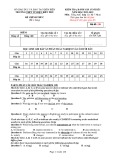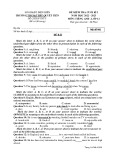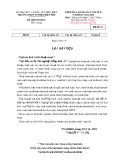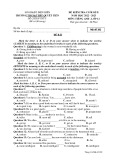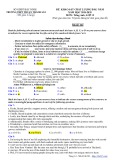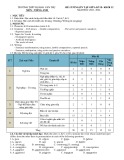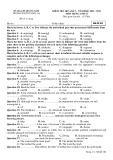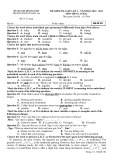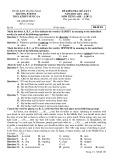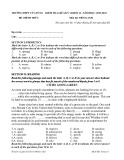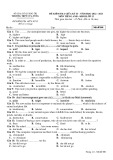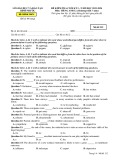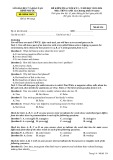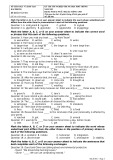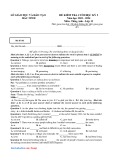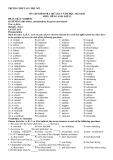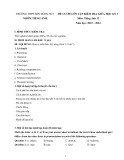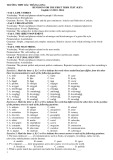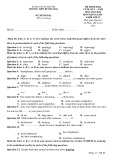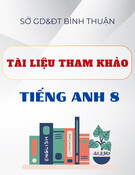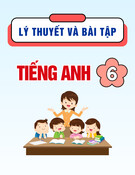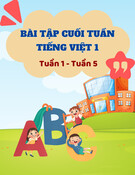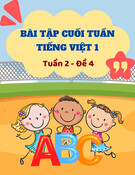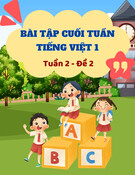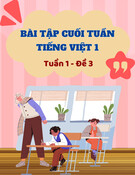BÀI ÔN KIỂM TRA ĐẦU VÀO – LỚP 12.
1: PRONUNCIATION ❖ PHÁT ÂM “ ED ” or “S / ES ”
k , p, f , t, th ( khắp phố phường tối thui ) /s /
Cách phát âm đuôi -s Ch, X , S, Z, Sh, SE, CE, GE ( Chúng xổ số zới Sh sẽ có ghệ ) / iz /
/ z /
Khi tận cùng trước nó là nguyên âm và các phụ âm còn lại
t , d ( tình đầu ) / id /
/ t / Cách phát âm đuôi - ed
sh, s, ch, ss, ce, x, k ,p, f = gh (Sáng sớm chi sáu chạy xe khắp phố phường )
/ d/
Khi tận cùng trước -ed nó là nguyên âm và các phụ âm còn lại
Note đuôi -s - “se” đọc là “z” or “s” - “Ce =S” - “gh” đọc là “f” : laugh , cough, tough , rough Note đuôi -ed Đuôi -ed trong các tính từ sau được phát âm /id/: aged, learned, beloved, blessed, naked, ragged wicked , blessed , wretched
PRACTICES
Mark the letter A, B, c, or D to indicate the word whose underlined part differs from the other three in pronunciation in each of the following questions.
1
Question 1: A. passed Question 2: A. ejects Question 3: A. produced Question 4: A. affected B. managed B. defends B. believed B. looked C. cleared C. advocates C. stopped C. decreased D. threatened D. breaths D. laughed D. washed
C. realized C. agreed C. cultures C. attended C. travelled C. graphs C. replaced C. helps C. finished C. games C. recorded C. joins C. finished C. leaves C. reminded C. couple C. absorbed C. laughs C. preferred C. balanced C. heaps
B. worked B. appeared B. bikes B. cooked B. candied B. speeds B. pleased B. knows B. declared B. thanks B. trusted B. loves B. performed B. goes B. approved B. plough B. reached B. takes B. established B. infested B. tightens D. watched D. coughed D. involves D. laughed D. dried D. beliefs D. fixed D. sits D. developed D. enthusiasts D. acted D. spends D. delivered D. potatoes D. relieved D. cousin D. solved D. volumes D. stopped D. reached D. coughs
Question 5: A. missed Question 6: A. loved Question7: A. imagines Question 8: A. finished Question 9: A. concerned Question 10: A. speaks Question 11: A. increased Question 12: A. looks Question 13: A. linked Question 14: A. sports Question 15: A. sacrificed Question 16: A. cooks Question 17: A. interviewed Question 18: A. misses Question 19: A. removed Question 20: A. young Question 21: A. failed Question 22: A. develops Question 23: A. advanced Question 24: A. processed Question 25: A. likes 2: STRESS Tiếng Anh là ngôn ngữ đa âm tiết. Những từ có hai âm tiết trở lên luôn có một âm tiết phát âm khác biệt hẳn so với những âm tiết còn lại về độ dài, độ lớn và độ cao. Âm tiết nào được phát âm to hơn, giọng cao hơn và kéo dài hơn các âm khác trong cùng một từ thì ta nói âm tiết đó được nhấn trọng âm. Hay nói cách khác, trọng âm rơi vào âm tiết đó. Khi nhìn vào phiên âm của một từ thì trọng âm của từ đó được kí hiệu bằng dấu (') ở phía trước, bên trên âm tiết đó.
QUY TẮC CHUNG NGOẠI LỆ VÍ DỤ
follow, listen, open, guitar, patrol, visit 1. Từ có 2 âm tiết: - Danh từ hoặc tính từ: nhấn ở âm tiết đầu - Động từ: nhấn ở âm tiết hai candy, really, active, carrot dictate, present, export, begin, dictate, present, export, prevent
economic, revision, colonial, musician, familiar, experience, efficient, gymnasium, continuous arithmetic, heretic, appliance
2
2. Các từ tận cùng là: IC, ION, ICAL, IAL, IAN, IAR, IENCE, IENCY, IENT, IANCE, LOGY,ETY ITY, IOUS, EOUS, UOUS ( nhấn trước nó một vần )
1111mot
1 âm)
centigrade, committee, overseer employee, Vietnamese, engineer, volunteer, bamboo, balloon, cigarette, picturesque 4. Các từ tận cùng là: ADE, EE, ESE, EER, OO, OON, ETTE, ESQUE, trọng âm thường nhấn ở vần cuối. ( nhấn trên chính nó)
5. Danh từ kép, trọng âm rơi vào âm tiết đầu blackbird, greenhouse
bad-tempered, old- fashioned understand, overflow 6. Tính từ kép, động từ kép, trọng âm rơi vào âm tiết thứ hai
CHÚ Ý KHI XÉT TRỌNG ÂM
- Đối với từ có 3 âm tiết hoặc có 4 âm tiết: - trọng âm rơi và âm tiết ở trước hậu tố ‘tion, ion, ment’ Nếu tất cả các âm mà ngắn hết thì trọng âm rơi vào âm tiết thứ nhất
Trọng âm thường rơi vào nguyên âm dài/nguyên âm đôi hoặc âm cuối kết thúc với nhiều hơn một phụ âm
Trọng âm không bao giờ rơi vào âm /ə/hoặc là âm /əʊ/.
Đối với từ có 2 âm tiết: - khi âm tiết đầu được phát âm là /ə/ thì trọng âm rơi vài âm tiết thứ 2
PRACTICES
3
Mark the letter A, B, c, or D to indicate the word that differs from the other three in the position of the main stress in each of the following questions. Question 1: A. apply B. persuade C. reduce D. offer
Question 2: A. preservatives Question 3: A. president Question 4: A. economy Question 5: A. elephant Question 6: A. scientific Question 7: A. conference Question 8: A. intentional Question 9: A. explain Question 10: A. represent Question 11: A. minister Question 12: A. equip Question 13: A. involve Question 14: A. hospital Question 15: A. garment Question 16: A. different Question 17: A. sorrow Question 18: A. certainty Question 19: A. publish Question 20: A. police Question 21: A. attract Question 22: A. delicate Question 23: A. figure Question 24: A. engage Question 25: A. original Question 26: A. person Question 27: A. situation Question 28: A. different Question 29: A. gorilla Question 30: A. promote B. congratulate B. physicist B. unemployment B. dinosaur B. intensity B. lecturer B. optimistic B. happen B. intensive B. dependent B. listen B. provide B. inflation B. comment B. achievement B. schooling B. activity B. replace B. system B. amaze B. promotion B. honest B. import B. responsible B. hotel B. appropriate B. bamboo B. interesting B. precede C. preferential C. inventor C. communicate C. buffalo C. disappearance C. researcher C. environment C. decide C. domestic C. encourage C. answer C. install C. policy C. cement C. educate C. passion C. organize C. involve C. woman C. offer C. volcanic C. polite C. conserve C. reasonable C. signal C. informality C. rainfall C. September C. picture D. development D. property D. particular D. mosquito D. expectation D. reference D. participant D. combine D. employment D. agreement D. enter D. comment D. constantly D. even D. primary D. subtract D. compliment D. escape D. novel D. require D. resources D. happy D. maintain D. comparison D. instance D. entertainment D. wildlife D. opponent D. pollute
SIMPLE PRESENT (Hiện tại đơn) SIMPLE PAST (Quá khứ đơn)
S + V[-s/es] S + V-ed/V cột 2
3:VERB TENSES Thì Dạng Khẳng định Phủ định Nghi vấn S + don’t / doesn’t + V1 Do / Does + S + V1 …? S + didn’t + V1 Did + S + V1 …?
Dấu hiệu nhận biết - always, usually, occasionally, often, … - every:every day, every year, every Sunday - once a day , twice…, 3 times… - yesterday - last + time: last week, last Sunday… - time+ ago : two months ago, five years ago… - in the past, in + year (past): in 1990, …
4
Thì Dạng PRESENT CONTINUOUS (Hiện tại tiếp diễn) PAST CONTINUOUS (Quá khứ tiếp diễn)
S + am / is / are + V-ing S + was / were + V-ing
Khẳng định Phủ định Nghi vấn S + am not / isn’t / aren’t + V-ing Am / Is / Are + S + V-ing …? S + wasn’t / weren’t + V-ing Was / Were + S + V-ing …?
Dấu hiệu nhận biết
- now, at present - at the moment - Sau câu mệnh lệnh : Vd: Keep silent! The baby is sleeping. Look! He is running. - At that moment - When / As + S + (simple past), S + was/ were V-ing Vd: When I came, she was crying. - While : Vd: A dog crossed the road while I was driving.
PRESENT PERFECT (Hiện tại hoàn thành) PAST PERFECT (Quá khứ hoàn thành)
S + has / have + V-ed/V cột 3 S + had + V-ed/V cột 3
Thì Dạng Khẳng định Phủ định Nghi vấn S + hasn’t / haven’t + V-ed/ V cột 3 Has / Have + S + V-ed/ V cột 3 …? S + hadn’t + V-ed/ V cột 3 Had + S + V-ed/ V cột 3…?
Dấu hiệu nhận biết - after + S + had V3/ED , (simple past) - before + (simple past), S + had V3/ED - By the time + S + V(simple past) , S + had V3/ED: cho đến lúc........ - just, already, ever, yet, recently, lately,.. - since, for : since 1995, for 9 years - so far, up to now , It is the first time…..
SIMPLE FUTURE (Tương lai đơn) FUTURE PERFECT (Tương lai hoàn thành)
S + will + V 1 S + will have+ V-ed/ V cột 3
Thì Dạng Khẳng định Phủ định Nghi vấn S + won’t + V 1 Will + S + V 1? S + won’t have + V-ed/ V cột 3 Will + S + have + V-ed/ V cột 3…?
Dấu hiệu nhận biết - tomorrow - next + time : next week, next Monday,…. - in the future
- by the end of this month - by the time+S+ V (simple present), S + will have V3/ED PRACTICES
B. has been studying C. studies D. studied
D. had hiked B. is hiking C. hiked
C. was crying D. has cried
B. has been living C. was living D. lived
5
Mark the letter A, B, C, or D on your answer sheet to indicate the correct answer to each of the following questions. 1. Jane________ law at Harvard for four years now. A. is studying 2. Linda took great photos of butterflies while she________ in the forest. A. was hiking 3. She_______ _for hours. That’s why her eyes are red now. A. cried B. has been crying 4. When I last saw him, he________ in London. A. is living 5. By the time he arrives here tomorrow, they________ for London. B. will have left A. would have left D. are leaving C. will left
B. got/left D. got/was left C. had got/had left
D. got C. will have got
B. had never been C. was never being D. were never
D. walked B. am walking
D. is having
D. runs B. running C. was running
D. left C. have left
B. had been married D. will have been married
C. was B. has been D. had been
B. wouldn’t see C. haven’t seen
D. haven’t seen C. hadn’t seen B. didn’t see
D. had started C. has started B. started
B. had played C. played
B. were you doing C. would you do
C. have never seen B. had never seen D. never see
D. have visited C. am visiting B. visit
D. has asked C. asked B. asks
C. have finished B. will finish D. finished
D. is starting B. will start C. started
B. has recovered D. was recovering
6
6. When I________ to the airport, I realized that I________ my passport at home. A. got/had left 7. Call me as soon as you________ your test results. A. get B. will get 8. I________ to Greece until Sally and I went there last summer. A. have never been 9. I________ along the street when I suddenly heard footsteps behind me. C. walk A. was walking 10. He occasionally________ a headache in the morning. A. has had C. have B. has 11. The boy fell while he________ down the stairs. A. run 12. I will come and see you before I________ for America. B. will leave A. leave 13. When the first child was born, they _______ for three years. A. have been married C. will be married 14. It________ a long time since we were apart. I did not recognize her. A. will be 15. Many of the people who attended Mr. David’s funeral________ him for many years. A. didn’t see D. hadn’t seen 16. We were both very excited about the visit, as we________ each other for ages. A. never saw 17. His health has improved a lot since he________ doing exercises regularly. A. starts 18. She hurt herself while she________ hide-and-seek with her friends. D. was playing A. is playing 19. .What________ at 9 o’clock last night? I phoned you but couldn’t get through to you. A. did you do D. had you done 20. It is raining heavily with rolls of thunder. We________ such a terrible thunderstorm. A. would never see 21. I _______ my old teacher last week. A. visited 22. My brother usually ________me for help when he has any difficulties with his homework. A. ask 23. I ______ all of my homework last night. A. finish 24. Lan ________ learning English a few years ago. A. starts 25. Only after she________ from a severe illness did she realize the importance of good health. A. would recover C. had recovered 26. Only after the bus________ for a few miles did Jane realize she was on the wrong route. A. was running B. had run C. has run D. runs
B. had all gone C. had all been going D. have all gone
C. walked D. had walked
C. left B. leave D. had left
C. witnessed B. have witnessed D. are witnessing
D. has moved C. moved B. moves
D. were waiting C. had waited B. waited
D. were waiting C. had waited B. waited
B. were walking - asked D. walked - asked
B. had called /watched D. was calling /watched
27. The children________ to bed before their parents came home from work. A. were all going 28. Paul noticed a job advertisement while he________ along the street. A. was walking B. would walk 29. I haven’t met him again since we________ school ten years ago. A. have left 30. For the last 20 years, we ________ significant changes in the world of science and technology. A. witness 31. My best friend Lan ________to England 10 years ago. A. was moving 32. While I________ at the bus stop, three buses went by in the opposite direction. A. was waiting 33. When I________ for my sister in front of the supermarket, a strange man came to talk with me. A. was waiting 34. We_______ _in silence when he suddenly________ me to help him. A. walked - was asking C. were walking - was asking 35. When Carol________ last night, I________ my favorite show on television. A. called /was watching C. called /have watched 4. VERB FORM (BẢNG DẠNG CỦA ĐỘNG TỪ )
V-ing
To-V
V1
Ving & To-V
1. Giới từ : in, on,at.. 2. love , like , enjoy, prefer >< hate, dislike 3. start , begin, give up >< stop , finish 4. suggest 5. consider : xem xét 6. mind 7. imagine 8. avoid 9. risk 10. miss 11. practice 12. postpone 13. involve 14. admit 15. deny 16. quit = give up 17. keep 18. spend
1. agree 2. ask / told / warn 3. choose 4. decide 5. demand 6. expect 7. hope 8. manage 9. offer 10. plan 11. promise 12. refuse 13. seem 14. suppose 15. tell 16. want 17. tend 18. threaten 19. would like 20. would love 22. be able
1. Sau khiếm khuyết động từ can - could will – would have to – had to may – might must ought to 2. Sau V tri giác See Look Listen Notice Watch Observe Feel Taste Smell 3. Let
1.allow permit recommend + O + To-V advise encourage ----------------------------------- allow permit recommend + V-ing advise encourage => Be + V3/ed + To-V ----------------------------------- 2.Stop + V-ing : ngừng hẳn ( từ bỏ thói quen ) Stop + To-V : ngừng để làm việc khác 3.remember forget + V-ing regret
7
23. wish 24. too….to 25. enough to 26. It + be + adj+To-V 27. It takes 28. Sau các nghi vấn từ how , what , where… 29. sau đại từ bất định Someone , something, anything…. 30. Câu bị động 31. only, first, last
Make + O Have Help => Bị động ta dùng “ To-V” 4. had better would rather had sooner 5. do nothing but 6. cannot but
( diễn tả 1 hđộng đã xảy ra trong quá khứ ) ----------------------------------- remember forget + To-V regret (diễn tả 1 hđộng sắp xảy ra) 4.Try + V-ing : thử Try + to V : cố gắng 5.Consider + V-ing: xem xét Consider + to V : quan tâm 6.like start + V-ing / To-V begin( không thay đổi nghĩa )
19. waste 20. fancy 21. can’t help 22. can’t stand 23. can’t bear 24. be busy 25. be worth 26. continue 27. It’s no use 28. It’s no good 29. have trouble 30. have difficulty 31. be / get used to 32. go 33. appreciate PRACTICES
Mark the letter A, B, C, or D on your answer sheet to indicate the correct answer to each of the following questions.
1. I couldn't help at his jokes.
A. laugh B. laughing C. to laugh D. laughed
2. Tom offered A. to give Jane a ticket to the theater, but she refused to take it. B. give C. giving D. to be given
3. Those workers stopped their coffee because they felt tired of their new work.
A. drink B. drank C. drinking D. to drink
4. He asked them
A. help him B. should help him C. to help him D. help to him
5. Mr Minh advised my family leaving Vietnam.
A. to think B. not to think C. against D. against to
6. I hope that woman again.
A. to see B. of seeing C. seeing D. have seen
7. She wasted much time her old pair of shoes.
A. mend B. to mend C. mending D. to be mended
8. He regrets lazy last year. He lost his job.
A. to be C. been D. being B. be
9. She remembered that woman last month.
A. of seeing B. to see C. seeing D. have seen
8
10. David tried his best , but his girlfriend refused
A. explaining; to listen B. explaining; listening
C. to explain; to listen D. to explain; listening
11. Willy denied a whole bag of chocolate chip cookies before lunch.
A. eat B. to eat C. having eaten D. eaten
12. I was delighted my old friends again.
A. to see B. seeing C. seen D. to be seen
13. We regret you that we cannot approve your suggestion.
A. inform B. to inform C. informing D. informed
14. Have you ever considered a pharmacist?
A. become B. becoming C. to become D. became
15. You had better at home until you feel better.
A. staying B. stayed C. to stay D. stay
16. I remember my mother said the grass in the garden needed .
A. to hear; cutting B. hear; cut C. heard; to cut D. hearing; cutting
17. My teacher doesn't allow us while he is explaining the lesson.
A. talk B. to talk C. talking D. talked 18. If he really doesn’t feel like _________now, I suggested that he should go out for some fresh air.
A. work B. to work C. worked D. working
19. We have plenty of time. We needn't
A. hurry B. to hurry C. hurrying D. hurried
20. I promised on time. I mustn't late.
A. be; be B. to be; to be C. to be; be D. be; to be
21. My daughter sometimes practices _____ _ English with her friends after school. A. to speaking B. to speak C. speak D. speaking
22. When Tommy started to learn French, he had a difficult time _______ the words correctly. A. pronounce B. pronunciation C. pronouncing D. to pronounce
23. Most women expect_______________ _more help with the housework from their husbands. A. to get B. getting C. get D. to getting
C. being redecorated D. to redecorate A. redecorated
24. Your house needs ____________________. B. redecorating 25. I can’t read when I am traveling. It makes me __________sick. B. to feel A. feel C. felt D. feeling
26. I suggest _____________some more mathematical puzzles. C. doing A. do D. done
B. to do 27. Have you ever considered ______________a pharmacist? A. become B. becoming D. became
28. My father wanted me __________a pilot. A. become C. to become C. becoming D. became
B. to become 29. Please wait a minute. My boss is busy ___________something. C. to write B. writing A. write D. to writing
9
30. My teacher doesn’t allow us ___________while he is explaining the lesson. A. talk B. to talk C. talking D. talked
31. I promised __________on time. I mustn’t be late. A. be B. to be C. being D. am
32. Mary and I are looking forward ___________you. A. of seeing C. to seeing D. to see
B. for seeing 33. The students are used to ____________in the school library. A. working B. work D. worked
34. Our room needs ____________up. B. to tide A. tidied C. to work C. tidy D. tidying
35. “Was the test long?”. “Yes, John was the only one ___________it” D. finish A. to finish C. finished B. finishing
5 . TAG QUESTIONS Câu hỏi đuôi (tag question) là dạng câu hỏi rất hay được sử dụng trong tiếng Anh, đặc biệt là tiếng Anh giao tiếp. Câu hỏi đuôi là cấu hỏi ngắn ở cuối câu trần thuật. Câu hỏi này được dùng khi người nói muốn xác minh thông tin là đúng hay không hoặc khi khuyến khích một sự hồi đáp từ phía người nghe. Ví dụ:She is learning English now, isn't she? (Cô ấy đang học tiếng Anh bây giờ phải không?) B. Công thức chung: S + V +…………………….,trợ động từ + S( ĐẠI TỪ ) -Nếu câu nói trước dấu phẩy là khẳng định thì câu hỏi đuôi là phủ định và ngược lại.
Dưới đây là bảng tóm tắc cách thành lập câu hỏi đuôi. Tag questions
Statement
Isn’t/aren’t/wasn’t/weren’t + S? Shall we+? ……………..+ they ?
………………+ it?
aren’t I ? I am……… am I ? I am not……… Can’t/couldn’t/shouldn’t/won’t………+ Động từ khiếm khuyết S ? S + can/could/should/will……… Sử dụng trợ động từ: Do/does/did Động từ thường Don’t + S? S + V1…………….., Doesn’t + S? S + Vs/es………….., Didn’t + S? S + V2/ed…………, Haven’t/hasn’t/hadn’t + S ? S + have/has/had + V3/ed……………, Isn’t/aren’t/wasn’t/weren’t + S? S + is/are/was/were………………, Didn’t + S ? S + used to + V………, S +’d better/had better + V…………, Hadn’t + S? S +’d rather/would rather/would like + V…………, Would + S? There + is/are/was/were……………., Let’s + V………, Chủ từ là : No one/nobody/anyone/anybody/ everyone/everybody/someone/somebody Chủ từ là: nothing/anything/something/ Everything………….. Chủ từ là this/that………….. Chủ từ là these/those………. Trong câu có các từ phủ định:no/none/without Neither/hardly/seldom/rarely/little/never/few. S + ought to………, Câu mệnh lệnh
………………+ it? ……………..+ they ? Câu hỏi đuôi khẳng định không có N’T Shouldn’t + S? Will you?
10
PRACTICES
=> cấu trúc:" I + think/believe/suppose/…." + mệnh đề phụ thì ta dùng động từ trong mệnh đề phụ để xác định động từ cho câu hỏi đuôi. Ex: I think she will meet him, won't she? Cũng mẫu cấu trúc này nhưng nếu chủ từ không phải là "I" thì dùng động từ chính trong câu (think/believe/suppose/...) để xác định động từ cho câu hỏi đuôi. Ex: She thinks he will come, doesn’t she?
C. will they D. don’t they
C. is it B. haven’t you
C. isn’t it B. can’t it D. have you ________? D. can’t they
C. didn’t it B. hasn’t it D. wasn’t it
C. have it B. hadn’t they D. haven’t they
D. is she C. won’t she
D. do they
B. aren’t there C. aren’t they D. are they
C. are they B. is he D. is it
D. will not they B. won’t they C. don’t they
D. is this C. is it
D. does he C. isn’t he B. is he
B. don’t they D. do they C. does it
C. aren’t I B. isn’t I D. am I
B. isn’t she D. is she C. do I
B. aren’t you C. are you D. don’t I
11
Mark the letter A, B, C, or D on your answer sheet to indicate the correct answer to each of the following questions. 1. The cases of COVID 19 outside China have increased 13 fold,________? A. hasn’t they B. haven’t they 2. What you have said is wrong,_________? A. isn’t it 3. COVID 19 can be characterized as a pandemic, A. can it 4. The coronavirus had already overwhelmed China, South Korea, Iran and Italy,________? A. hadn’t it 5. Health authorities have activated their most serious response level,________? A. haven’t it 6. Your mother is cooking in the kitchen,_________? B. doesn’t she A. isn’t she 7. Chinese officials quickly shut down Wuhan market,_________? A. doesn’t it C. hadn’t they B. didn’t they 8. There are no easy ways to succeed,________? A. are there 9. No one is a better cook than my sister, ________? A. aren’t they 10. They’ll buy a new apartment, ________? A. will they 11. This house is not safe, ________? A. isn’t this B. isn’t it 12. Ba rarely goes out at night, ________? A. doesn’t he 13. Everybody looks tired, ________? A. doesn’t it 14. I’m a bad man, ________? A. am not I 15. I think she is a dentist, ________? A. don’t I 16. I don’t think you are an engineer, ________? A. do I 17. Let’s turn off the lights before going out, ________?
C. shan’t we D. won’t you B. will you
D. will you C. do you
C. do they D. doesn’t he B. don’t they
C. will she D. did they B. didn’t they
C. should I D. do I B. don’t I
C. mightn’t he D. mayn’t he B. may he
C. are they D. is it B. isn’t it
C. shall we D. don’t I B. will I
C. doesn’t it D. does it B. isn’t it
C. can she D. A&B
C. don’t you D. do you B. had you
C. had you D. wouldn’t you
D. don’t you B. can’t he
C. are these D. aren’t these B. are they
D. didn’t he B. does he C. did he
C. don’t they D. didn’t they B. did they
B. do Mary and Peter C. are they D. aren’t they
A. shall we 18. Don’t be late, ________? A. are you B. shall we 19. Someone wants a drink, ________? A. doesn’t it 20. Nobody phoned, ________? A. do they 21. I should keep silent, ________? A. shouldn’t I 22. He mightn’t get there in time, ________? A. might he 23. Everything is fine, ________? A. aren’t they 24. Let me take care of you, ________? A. may I 25. What a nice dress, ________? A. is it 26. One can be one’s master, ________? A. can’t you B. can’t one 27. You’d better stay at home, ________? A. hadn’t you 28. You’d rather learn English, ________? B. would you A. hadn’t you 29. You don’t believe Peter can do it, ________? A. do you C. can he 30. These are 3 oranges you bought yesterday, ________? A. aren’t they 31. He seldom helps her, ________? A. doesn’t he 32. They never go to the library with US, ________? A. do they 33. Mary and Peter don’t like English, ________? A. do they 34. I am not a liar, ________? A. am I B. aren’t I D. don’t I
C. do I 6 : RELATIVE CLAUSES A. CÁCH SỬ DỤNG ĐẠI TỪ QUAN HỆ
12
1. 4 trường hợp sử dụng MĐQH có dấu phẩy Danh từ riêng ( Viết hoa ) : Mary, Peter this, that, these, those + N(s) : This book ... Tính từ sỡ hữu + N : my, his, her, our, their, its, your + N Sỡ hữu cách ( N’s N ) : Hoa’s book
2. Cách sử dụng đại từ quan hệ trong mệnh đề không dấu “,”
+ who / that + whom / who / that + which / that + V + S + V + S + V + V / S V + N + S V
N chỉ người N chỉ người N chì người và vật + that N chỉ vật N chỉ người / vật + whose Thời gian Nơi chốn Lý do + when = in, on , at + which + S V + where= in,on,at + which + S V + S V + why = for which
THAT: thay thế cho WHO/ WHOM/ WHICH trong MÐQH không dấu phẩy 3. Các trường hợp dùng “ That”
❖ hình thức so sánh nhất ( the most , the adj-est ) ❖ đi sau các từ: only, the first, the last ❖ danh từ chỉ người và vật ❖ sau các đại từ bất định, đại từ phủ định, đại từ chỉ số lượng: no one, nobody, something, somebody, all, some, any, little, none.
B. BÀI TẬP TRẮC NGHIỆM VỀ “ WHO / WHOM / WHICH/ WHOSE....) - N chỉ người thường tận cùng bằng gốc “ or, er, ist, ian - N chỉ vật thường tận cùng bằng gốc “ ion, ment, .. - Phía sau là N thường dùng “ Whose” -> 1 số N thường gặp như: car, son, daughter, outlook, book, houses, mother, father, brother, parents - Nơi chốn dùng “ where” , thời gian dùng “ when”, lý do = “ why” - So sánh nhất ( the most ..., the + adj-est) dùng “ That” C. NỐI 2 CÂU DÙNG ĐẠI TỪ QUAN HỆ (Đầu câu là Người dùng Who giữa và cuối dùng Whom) Ex: Mary, is a good teacher. I saw her last week
B1: Xác định 2 từ giống ở câu 1 và câu 2 Câu 1 : Xác định từ giống Xem có dùng dấu “,” không Câu 2: Thay từ giống bằng “who / whom = người”/ “which = vật” , “ where= nơi chốn” , “ when= t.gian” “whose = sở hữu” Mary is a good teacher. Whom I saw last week B2: Đem “ Who/ which..” ra đầu câu 2
Mary, whom I saw last week, is a good teacher B3. Đem ca câu 2 đặt sau từ giống ở câu 1 và ghi
Ex1: She is the woman about whom I told you She is the woman who/whom/ that I told you about. Ex2:Did you find the world which you were looking up ? (NOT : _____the world up which you were looking ? ) Ex3: The woman without whom I can’t live is Jane ( NOT : The woman whom can’t live without is Jane )
phần còn lại câu 1 ( nếu có ) RELATIVE PRONOUNS FOLLWED BY A PREPOSITION Trong mệnh đề quan hệ có giới từ thì giới từ có 2 vị trí đứng: - Giới từ đứng trước đại từ quan hệ hoặc giới từ đứng sau động từ. - Lưu ý: Giới từ không đứng trước đại từ quan hệ “ who và that” - Khi giới từ là thành phần của cụm động từ thì không thể đem giới từ ra trước “whom, which, whose” - Giới từ “ WITHOUT”không được đặt sau động từ mà phải đặt trước đại từ quan hệ.
REDUCTION RELATIVE CLAUSES
13
E.g: That man,who is standing over there,is my best friend. => That man,standing over there,is my best friend
Khi động từ trong mệnh đề quan hệ ở thể chủ động + am/is/are/was/were + V-ing +V1/Vs/es +V2/ed +has/have + V3/ed => Bỏ ĐTQH,Bỏ trợ động từ nếu có,Động từ chính => V-ing Khi động từ trong ,mệnh đề quan hệ ở thể bị động +am/is/are/was/were + V3/ed +have/has + been + V3/ed => Bỏ ĐTQH, Bỏ trợ động từ nếu có,Động từ chính => V-3/ED Khi đại từ quan hệ làm chủ ngữ đứng sau “first/last/second/only/next/one/dạng so sánh nhất hoặc để chỉ much đích,sự cho phép => Bỏ ĐTQH, Bỏ trợ động từ nếu có Động từ chính => To-V( chủ động) Động từ chính => to be V3/ed ( bị động) E.g: The boy who was injured in the accident was taken to the hospital =>The boy injured in the accident was taken to the hospital E.g: He was the last man who left the burning building. => He was the last man to leave the burning building. E.g This is the second person who was killed in that way => This is the second person to be killed in that way
Rút gọn mệnh đề bằng cụm danh từ có dạng: S + Be + N /cụm N/cụm giới từ => Bỏ ĐTQH, Bỏ be E.g: Football,which is a popular sport,ivery good for health. => Football, a popular sport,ivery good for health.
Mệnh đề quan hệ chứa tobe và tính từ/cụm tính từ => Bỏ ĐTQH, Bỏ be giữ nguyên tính từ phía sau E.g:My grandmother,who is old and sick,never goes out of the house. => My grandmother, old and sick,never goes out of the house.
PRACTICES Mark the letter A, B, C, or D on your answer sheet to indicate the correct answer to each of the following questions.
was released after the court was found innocent of all the charges
1. The young man against him. A. who B. who he C. which D. whose 2. Is that the same film we watched last year? B. which C. why D. who A. when 3. The girl I borrowed the dictionary asked me to use it carefully. A. whose B. from whom C. from whose D. whom 4. The first television picture John Logie Baird transmitted on 25 November, 1905 was a
boy worked in the office next to Baird's workroom in London.
A. which; whom B. who; which C. that; whose D. that; who 5. Joyce Bews, was born and grew up in Portsmouth on the south coast of England,
she still lives, was 100 last year.
A. that; in which B. who; where C. that; where D. who; that 6. The pollution A. that they were talking is getting worse. C. which B. about which D. whom 7. Robert Riva, an Italian player used to play for Cremonese, now coaches the Reigate under
14
11’s football team.
C. where
A. when B. which D. who 8. When I was at school, there was a girl in my class skin was so sensitive that she couldn't
expose her skin to the sun even with cream on.
A. where B. whose C. whom D. that 9. Unfortunately, the friend with I intended to go on holiday to Side is ill, so I'll have to
D. that B. whom cancel my trip. A. who C. where 10. The new stadium, will be completed next year, will seat 30,000 spectators. D. which B. where A. what C. when 11. Blenheim Palace, Churchill was born, is now open to the public. D. whose B. where C. which I introduced you to last night may be the next president of the university. D. why B. whom A. when 12. The man A. which C. whose 13. Cathy is trustworthy. She's a person upon you can always depend. C. that B. whom A. who 14. Your career should focus on a field in D. ∅ you are genuinely interested. D. ∅ C. that B. what A. which outlook on life is optimistic are usually happy people. 15. People B. whom C. that D. which dress you admire has been working for an export company since she left school. D. whom B. what A. whose 16. The girl A. who C. whose 17. One of the people arrested was Mary Arundel, is a member of the local council. D. ∅ B. who C. whom sank in 1922, was supposed to be unsinkable. D. who B. that A. that 18. The Titanic, A. whose C. which 19. The Newspaper is owned by the Mearson Group, _________chairman is Sir James Bex. D. whose C. who A. which 20. Genghis Khan, B. that name means "very mighty ruler", was a Mongol emperor in the Middle
Ages.
A. whom B. whose C. who D. how 21. She has two brothers, are engineer. A. whom both B. both who C. both of whom 22. Extinction means a situation D. both whom a plant, an animal or a way of life stops existing. B. for which C. on which D. in which I was the guest of honor, was extremely enjoyable. A. to which 23. The party, A. at that B. at which C. to that D. to which 24. Ann has a lot of books, she has never read. A. most of that B. most of these C. most of which D. which most of them in Bac Ninh Province. A. located C. which locates D. to locate 25. We have just visited disadvantaged children in an orphanage B. locating 26. An endangered species is a species population is so small that it is in danger of
C. what D. who
B. which protein and iron, are a popular snack. B. provide D. which provide C. which on this project try to find the solutions to air pollution. becoming extinct. A. whose 27. Pumpkin seeds, A. that 28. The scientists A. working B. worked C. are working D. who working
15
29. The girl ______ is our neighbor. A. talks to the lady over there C. was talking to the lady over there
B. is talking to the lady over there D. talking to the lady over there
30. She didn’t tell me the reason _______ she came late. A. when B. for which C. for why D. both B and C
31. Taj Mahal, _____ by Shah Janhan for his wife, is thought to be one of the great architectural wonders
of the world. A. building B. to build C. built
D. to be built 32. Mr. Jones, ______I was working, was generous about overtime payments. A. he C. for him D. whom
B. for whom 33. Is this the address to ____________ you want the package sent ? B. which C. that D. whom A. where
34. He was the last man _________ the ship. A. who leave B. to leave C. leaving D. left
35. The nurse_________ from Japan can speaking English well. A. which comes B. who come C. coming D. came
36. Tom was the last ______the classroom yesterday. A. to leave C. left D. leaves
B. leaving 37. The palace _____ many centuries ago remains practically intact. B. to build A. building C. built D. people build
38. Many of the pictures ________ from outer space are presently on display in the public library A. sending B. sent C. which sent D. which is sending
39. The house ______ in the storm has now been rebuilt . A. destroyed B. destroying C. which destroyed D. that is destroyed
40. The man ______ at the blackboard is our teacher . A. stood B. stands C. standing D. to stand
-------------------------
7: CONDITIONAL SENTENCES
If + S + V-hiện tại đơn,S + will/can + ( not) + V1 (is/am/are/V/Vs/es)
LOẠI 1
Đảo ngữ (not đặt sau chủ từ) Should + S + V, S + will/can + ( not) + V1
If + S + V-quá khứ đơn),S +would/could +(not) + V1 (were/V2/ed)
LOẠI 2
Đảo ngữ Were + S, S +would/could +(not) + V1 (not đặt sau chủ từ) If + S + had (not) + V3/ed,S + would/could + have +V3/ed Were + S + to V1, S +would/could +(not) + V1
A.TYPES OF CONDITIONAL SENTENCES
16
CÁC LOẠI CÂU ĐIỀU KIỆN
LOẠI 3
Đảo ngữ
Had + S + V3/ed,S + would/could + have +V3/ed
PRACTICES Mark the letter A, B, C, or D on your answer sheet to indicate the correct answer to each of the following questions. 1. If you fail the GCSE examination, you ____not be allowed to take the entrance examination to the university.
A. will B. would C. did D. are
2. If you_____5 minutes late, you won’t be able to get into the examination room.
A. will be B. were C. are
D. would be 3. If you _____ the application form after deadline, you will not be able to take the entrance exam.
A. send B. will send C. would send D. sent
4. _____ he passes the final exam, he will apply for the Ho Chi Minh Technology University.
A. Unless B. If C. As long as D. Both B and C
5. If she spoke English well, she _____ that job. B. will be offered A. will offer C. would offer D. would be offered
6. He would get mark 10 if he _____again the paper. He made one mistake in it. C. reads D. will read A. read B. is reading
7. If I _____ get a car sick, I would go there with you. A. won’t B. don’t C. didn’t D. wouldn’t
8. I _____ you a letter if I had known your address. A. would have sent B. would send C. will send D. sent
9. If you _____ the front door carefully, the thieves wouldn’t have broken into your house.
A. have locked B. locked C. would lock D. had locked
10. If I_____ by her, I would have come to see her while I was in Dalat.
A. had invited B. had been invited D. have invited
C. were invited 11, If you _____ told us about the bad service, we would have eaten there.
A. hadn’t B. don’t C. didn’t D. wouldn’t have
12, If I _____ you were sick. I would have called sooner.
B. had known C. know D. would have A. knew
known
13) If there _____ a row, I’m going to keep out of it. A. will be B. is C. were D. had been
14) If I _____ you, I’d call and apologise.
A. am B. were C. would be D. was
15) Jack will win the election if he __________ harder.
A. will campaign B. would campaign C. campaigned D. campaigns
17
16) If that hat costs much, I_____ a small one. A. would have bought B. will buy C. bought D. would buy
D. driven B. drove A. drive C. had driven
D. had made C. made B. makes A. make
D. would be B. were C. will be A. was
B. go/would meet D. went / would have met A. went/would meet C. had gone / would have met
A. ask C. asked D. had asked
C. will invite B. have invited A. would have invited D. would invite
A. hear B. hears C. heard D. had heard
A. had B. had had C. will have D. have
B. not let A. won’t let C. wouldn’t let D. hadn’t let
A. not go C. hadn’t gone B. don’t go D. didn’t go
A. were C. be D. was
B. had won C. won A. win D. winning
C. was B. am A. is D. were
A. have / would go B. had / will go C. had had / would have goneD. have had / go
A. know / would come C. had known / will come B. had known / would have come D. known / had come
A. would B. will C. did D. had
A. would write D. wrote
A. is / will know B. was / knows C. were / would know D. are / would have known
C. would get A. will get B. got D. had got
B. comes A. come C. came D. had come
18
17) If you_____ more carefully, you wouldn’t have had so many accidents. 18) If I_____ that mistake again, my teacher will get angry with me. 19) If I spoke English, my job_____ a lot easier. 20) If he_____ to London yesterday, _____ his old friend. 21) I will lend them some money if they_____ me. B. will ask 22) If we had known who he was, we_____ him to speak at our meeting. 23) My dog will bark if it_____ any strange sound. 24) If I_____ enough money, I would buy a house. 25) They_____ you in if you come late. 26) If you_____ away, I’ll send for a policeman. 27) If I_____ in your place, I would accept Mr. Anderson’s invitation. B. am 28) If I_____ a big prize in a lottery, I’d give up my job. 29) If I_____ you, I would tell the truth. 30) I was busy. If I_____ free time, I_____ to the cinema with you. 31) Why didn’t you attend the meeting?- Oh, I did not know. If I_____, I_____ there. 32) What_____ we do if they do not come tomorrow? 33) If I had enough time now, I_____ to my parents. C. will write B. write 34) It’s too bad Helen isn’t here. If she_____ here, she_____ what to do. 35) If I don’t eat breakfast tomorrow morning, I_____ hungry during class. 36) If she_____ late again, she’ll lose her job. 37) I’ll let you know if I_____ out what’s happening. C. found B. finds A. find D. had found
A. live B. lived C. would live D. had lived
B. arriving A. arrive C. arrived D. had arrived
38) If we_____ in a town, life would be better. 39) I’m sure he wouldn’t mind if we_____ early. 40) If I won the lottery, I_____ you half the money. B. had given A. gave C. will give D. would give
8. COMMUNICATIONS
1. MẪU CÂU ĐỀ NGHỊ NGƯỜI KHÁC GIÚP: (Making request) Trả lời Đề nghị Không đồng ý Đồng ý
- I’m sorry. I can’t. I’m busy. (I have something else to do.) - I’m sorry. I don’t know how to do it.
- V-inf…! - V-inf…., please! - Please + V-inf …! - Can you + V-inf…? - Could you + V-inf…? - Would you please + V-inf…? - Will you + V-inf…? - I wonder if you’d/could + V-inf …? * Riêng với mẫu: - Would/Do you mind + V-ing…? - Certainly. - Of course. - Sure - No problem. - What can I do for you? - How can I help you? - By all means. - Yes, with pleasure - No, I don’t mind. - No, of course not. - Not at all. 2. MẪU CÂU ĐỀ NGHỊ GIÚP NGƯỜI KHÁC: (Making offer) Đề nghị Trả lời
- Can I help you? - Shall I + V-inf…? - What can I do for you? - May I help you? - Do you need any help? - Let me help you - Yes/No. Thank you - That’s very kind of you. - Don’t worry! I’ll do it. - That would be great. - Oh, would you really? Thanks a lot. - Well, that’s very kind of you, but I think I can manage, thanks. - No, thank you. I can manage.
Xin phép
Đồng ý
Trả lời
Không đồng ý
3. MẪU CÂU XIN PHÉP NGƯỜI KHÁC: (Asking for permission) - May I + V-inf …? - Can I + V-inf …? - Would you mind if I + V (chia quá khứ đơn)? - Do you mind if I + V (chia hiện tại đơn)? - Excuse-me! May I + V-inf…? - Do you think I could + V-inf…? - I wonder if I could + V-inf…? - Is it all right if I could/can + V-inf …? - Certainly. - Of course. - Please do. - Please go ahead. - Sure. - I'd rather you didn't. - I'd prefer you didn't. - No, I'm afraid you can't. - I'm sorry, but you can't. 19
4. MẪU CÂU "RỦ"/GỢI Ý: (Making suggestion) Câu "rủ"/gợi ý Trả lời
- Yes, let's. - No, let's not. - That's a good idea. - Yes, definitely. - Sure, why not? - By all means. - That's probably the best option.
- Let's + V-inf …? - Why don't we + V-inf …? - Shall we + V-inf …? - How about + V-ing…? - What about + V-ing…? - I think we should + V-inf… - I suggest that we + V-inf… - It might be a good idea if we + V-inf… - I think the best way of dealing with this situation would be + to V-inf… - If you ask me, I think we should/could + V-inf… 5. MẪU CÂU CẢM ƠN: (Saying thanks) Câu cảm ơn Trả lời
- You're welcome. - That's all right. - Not at all. - It's my pleasure. - Don't mention it.
- Pardon (me)! - Please say that again! - Excuse-me! What did you say? - Could you repeat that? - Thank you. - Thank you very much. - Thanks a lot. - Thanks a lot for (N/V-ing). - It's very kind of you. 6. MẪU CÂU XÁC ĐỊNH LẠI THÔNG TIN: (Confirming information) 7. MẪU CÂU MỜI: (Making invitation) Câu mời Trả lời - Would you like + món ăn/uống? Mời ăn uống
- Would you like + to V-inf…? - Do you fancy + V-ing…? - Do you feel like + V-ing…?
Mời đi đâu/làm gì
- Yes, please. - No, thanks. - Yes, I'd love to. (Thanks) - That's very kind of you, thanks. - That sounds lovely (interesting). - That's a good idea. Thanks. - That would be great. Thanks. - I'm sorry. I'm afraid I can't. - That's very kind of you, but… 8. MẪU CÂU CHÚC MỪNG: (Congratulating others) Câu kể Trả lời (câu chúc mừng)
- I've passed the entrance exam. - I've got a driving licence. - …………………. - You did a great job! - Congratulations! - Excellent! - Well done! 9. MẪU CÂU XIN LỖI: Câu xin lỗi Trả lời
20
- I'm very/extremely/awfully/terribly + sorry. - Sorry. It's/was my fault. - I do apologise. - Please accept my apologies. - I'm sorry for + N/V-ing - That's all right, ok. - Not too worried! - No need to apologize. - Don't worry about it! - Never mind!
10. MẪU CÂU THỂ HIỆN LỜI KHEN: (Compliments) Câu thể hiện lời khen Trả lời
- It's very kind of you to say so, thank you! - Thank you. That's a nice compliment. - Thanks. I think I've finally found (the color, the style, the way…) that + Verb… - I'm glad you like it, thanks. - You've got to be kidding./You must be kidding. I thought it was terrible,
- You really have + positive adjective + Noun. - I've never seen such a perfect thing on you. - Your + noun + is/was + positive adjective + complement - You are a/an + positive adjective + complement - What (a/an) + positive adjective + Noun! - How + positive adjective/adverb + subject + Verb! PRACTICES
B. It’s on the wall D. You’re welcome.
B. It’s not true. D. You’re wrong.
C. Me neither D. Thank you B. It’s alright
B. I don’t quite agree D. That’s quite true
D. I absolutely agree with you
C. You’re welcome D. Yes, please B. Me too
21
Mark the letter A, B, C, or D on your answer sheet to indicate the sentence that best completes each of the following exchanges 1. David is talking to Lucy about her painting. - David: “What a beautiful painting!” - Lucy: “____________” A. No problem C. I’m glad you like it 2. Peter and Dane are talking about environmental protection. - Peter: “We should limit the use of plastic bags.” - Dane: “____________. We can use paper bags instead.” A. I completely agree. C. I don’t quite agree 3. David is apologising to his teacher for being late. - David: “Sorry I’m late! The traffic is so heavy.” - Teacher: “____________. Come in and sit down.” A. You’re so kind 4. Peter and Mary are talking about social networks. - Peter: “Using social networks may have negative effects on students.” - Mary: “____________. It distracts them from their studies.” A. I’m not sure about that C. You’re wrong 5. Linda and Peter are talking about safe driving. - Linda: “I think drink-driving should be severely punished.” - Peter: “____________. It may cause accidents or even deaths.” A. You must be kidding B. I don’t think so C. I don’t understand what you mean 6. A porter is talking to Mary in the hotel lobby. - Porter: “May I help you with your suitcase?” - Mary: “____________” A. What a shame 7. John is having dinner at Linda’s house. - John: “This roast beef is so delicious.” - Linda:”____________” A. sure. I’d love to B. I’m glad you like it.
B. You must be kidding D. That’s not a good idea
B. Good job! C. With pleasure D. You’re welcome
B. You’re exactly right D. I don’t think so
B. We are too busy on weekdays. D. The library would be best.
B. No. You’re in no mood for the event. D. Yeah. I’m really looking forward to it.
B. Can I pay by credit card? D. You’re welcome.
D. That’s right.
B. Don’t mention it. C. Thank you. D. You’re welcome.
B. That’s very kind of you. D. What a pity!
B. It’s alright. D. It’s nonsense.
22
C. No, don’t worry. D. I don’t either. 8. Joana and David, two lectures, are talking about library skills. - Joana: “I think we should teach our students how to use the library.” - David:”____________ A. You’re absolutely wrong C. I couldn’t agree with you more 9. A shop assistant is talking to a customer. - Shop assistant: “Do you need anything else?” - Customer:”____________” A. That’s all. Thanks 10. Ann and Peter are talking about housework. - Ann: “ I think children should be paid for doing the housework.” - Peter: “____________. It’s their duty in the family.” A. That’s what I think C. There’s no doubt about it 11. Ken and Tom are high-school students. They are discussing where their study group will meet. - Ken: “Where is our study group going to meet next weekend?” - Tom: “____________.” A. Studying in a group is great fun. C. Why don’t you look at the atlas? 12. Mike and Lane are university students. They are talking about Lane’s upcoming high-school reunion. - Mike: “So, you have your fifth high-school reunion coming up?” - Lane: “ A. Oh, the school reunion was wonderful. C. The food at the reunion was excellent. 13. A waiter in a restaurant is talking to a customer who has just finished his meal there. - Waiter: “Here’s your bill, sir.” - Customer: “____________” A. Don’t mention it. C. What do you have? 14. Two close friends Tom and Kyle are talking about Kyle’s upcoming birthday. - Tom: “Can I bring a friend to your birthday party?” - Kyle: “____________” C. The more the merrier. B. Let’s do it then. A. It’s my honor. 15. Two friends Diana and Anne are talking about Anne’s new blouse. - Diana: “That blouse suits you perfectly, Anne.” - Anne: “____________’’. A. Never mind. 16. Mary is talking to a porter in the hotel lobby. - Porter: “Shall I help you with your suitcase?” - Mary: “____________” A. Not a chance. C. I can’t agree more. 17. Susan accidentally stepped on Denise’s foot. - Susan: “Oops! I’m sorry, Denise.” - Denise: “____________” A. You shouldn’t do that. C. You are welcome. 18. Hana and Jenifer are talking about a book they have just read. - Hana: “The book is really interesting and educational.” - Jenifer: “____________”
B. That’s nice of you to say so. D. Don’t mention it.
B. I’m shopping for food D. I’m doing well
B. I don’t agree D. I can’t agree more
B. Congratulations! D. It’s very kind of you.
C. I’m thirty years old D. Fine, thank you
B. I can’t agree with you more D. No, I don’t think so
B. I’ve passed the exam with an A. D. I didn’t do well in the exam.
C. That’s nonsense B. Absolutely. D. I doubt it
B. What a nice car! D. My car is very expensive.
23
A. I’d love it. C. I couldn’t agree more. 19. Jolie and Tom are meeting at the supermarket. - Jolie: “Hi, Tom. How are you doing?” - Tom: “____________. How about you?” A. I’m waiting for my sister C. I’m doing nothing 20. Maria and Alex are talking about the environment. - Maria: “Our environment is getting more and more polluted. Do you think so?” - Alex: “____________. It’s really worrying.” A. I’ll think about that C. I don’t think so 21. Liz is telling Andrew about her first novel. - Liz: “Guess what? My first novel has just been published.” - Andrew: “____________” A. It’s my pleasure. C. Better luck next time! 22. Jenny and her teacher are meeting at the bus stop. - Jenny: “Good afternoon, Miss. How are you?” - Teacher: “____________. And you?” A. I’m going home B. I’m leaving now 23. Silas is talking to his roommate, Salah, about the Olympic Games. - Silas: “Do you think our country can host the Olympic Games some day in the future? - Salah: ”____________. We can’t afford such a big event.” A. You can say that again C. Yes, you’re right 24. Laura is telling Bob about her exam results. - Laura: “____________” - Bob: “That’s great. Congratulations!” A. I hope I’ll pass the exam tomorrow. C. I’ll get the exam results tomorrow. 25. Nancy and James are talking about their school days. - Nancy: “I think school days are the best time of our lives.” - James: “____________. We had sweet memories together then.” A. I’m afraid so 26. John and Mike are talking about Mike’s new car. - John: “____________” - Mike: “Thanks. I’m glad to hear that.” A. Where did you buy your car? C. Your car is new, isn’t it? 27. Two students are talking about the school curriculum. - Ted: “Swimming should be made part of the school curriculum.” - Kate: “____________. It is an essential life skill.” A. Oh, that’s a problem. B. I can’t agree with you more.
D. You can make it.
B. It’s not my duty.
B. Can you pass me the salt, please? D. Would you like a cup of coffee?
B. That’s all right D. I can’t agree more
24
C. Not at all 28. Jane is talking to Mike, who has just helped her with her luggage. - Jane: “____________” - Mike: “It’s my pleasure. A. It’s too heavy. C. Thanks a lot, indeed. D. Welcome back. 29. Adam and Janet are at the school canteen. - Adam: “____________” - Janet: “Yes, please.” A. Do you mind if I sit here? C. It’s a bit hot in here, isn’t it? 30. Jenny and Jimmy are talking about university education. - Jenny: “I think having a university degree is the only way to succeed in life.” - Jimmy: “____________. There are successful people without a degree.” A. That’s life C. I don’t quite agree ……………………………………………………..

